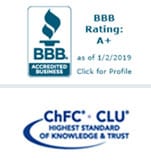
Recessions are a fact of modern life. We can’t predict them, but we know they occur, on average, every 7-9 years. We know that the U.S. has had 47 recessions, beginning with the Panic of 1785. And we know that there are warning signs: rising interest rates, stock sell-offs, large amounts of consumer debt, inverted yield curves—but these can also signal a simple slow-down, and no one wants to be the investor who cried bear and missed the bull. So, if if the next recession is unpredictable and unavoidable, what should we do? What can we do?
The simple answer: prepare. Here’s how.
1. Get rid of debt
While the economy is still solidly in the black, put some of your income toward paying down your debt. This will give you greater security in a downturn when you don’t want to be drawing on your assets more than necessary. It’s also good money management now that interest rates are rising and debt from credit cards, auto loans, and mortgages is becoming more expensive.
Start by making a list of all active accounts and loans. Find the smallest balance you owe, and then focus on paying it off while you pay the minimum on the others. When you’ve paid off the smallest balance move on to the second smallest, then the third smallest, and so on, until you’re debt-free.
2. Stock up your emergency savings
Before a blizzard, we buy toilet paper and milk. We leave the taps running. We put up storm windows as early as October. Our finances shouldn’t be any different.
And yet they are. Nearly 78% of Americans live paycheck to paycheck, according to CareerBuilder, including 10% of those making more than $100,000 per year. Part of this is due to the sad reality of wage stagnation—when you control for inflation, most Americans have the same purchasing power in 2019 as they did in 1974. Meanwhile, the costs of housing and healthcare have skyrocketed and employment itself has become less secure. The result? It’s now both more difficult—and more essential—to have an emergency savings fund that can cover 3-6 months of living expenses.
Luckily, there are simple ways to start or expand an emergency savings fund, even if you’re tight on cash. You can have a portion of your paycheck automatically deposited into your savings account whenever you get paid. Many large banks also allow you to schedule recurring transfers that move money from checking to savings on a daily, weekly, or monthly basis. Programs like Chime and Bank of America’s Keep the Change will round up your debit card purchases to the next whole number—and deposit the change into your savings.
3. Lower your fixed living costs
Cutting back on spending is easier than you think. The best news? You don’t even have to give up your Starbucks habit to do it. Start by making a list of your fixed expenses—expenses that you have to pay on a regular basis such as cable bills, memberships, and insurance payments. Next, look for services that could be reduced or cut. If you’re a Netflix junkie consider paring down your cable bill to a limited channel or internet-only package. Paying for a gym membership you never use? Ditch it. Had the same car insurance for five years? Use a platform like Nerdwallet to compare prices annually and make sure you’re getting the best deal.
4. Diversify your portfolio
Volatility has been the name of the stock market game for almost a year now, so we really can’t stress this enough. If you’re invested, make sure your portfolio features a variety of funds and asset-classes, including exposure to foreign and emerging markets. Diversity ensures that if one part of the market sinks, your entire portfolio won’t go down with it. It’s also important to make sure you’re not taking on more risk than you can handle.
Creating an optimally-diversified portfolio can be exceptionally difficult, especially if you’re not a trained investment manager. Regular maintenance, like rebalancing, can also be a headache to deal with on your own. That’s why we recommend working with a financial professional.
5. Consider a fixed index annuity
If you’re approaching retirement and the thought of another market meltdown has your stomach doing backflips, it may be time to consider moving some of your assets into a fixed index annuity. These products protect you from loss when the market falls, but allow you to take home a sizable percent when it rises. However, fixed index annuities aren’t for everyone, so it’s important to discuss this option with a knowledgeable advisor.


Sara McKinney
saractag@gmail.com
As Cowen Tax Advisory Group’s Digital Content Marketing Specialist, Sara provides in-house copywriting and manages the company’s electronic records system, email marketing, and blog.




